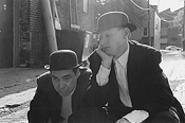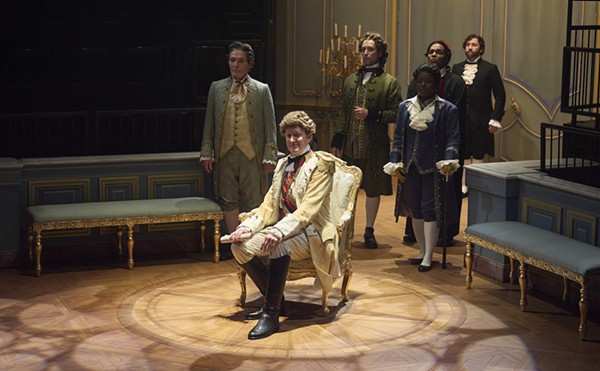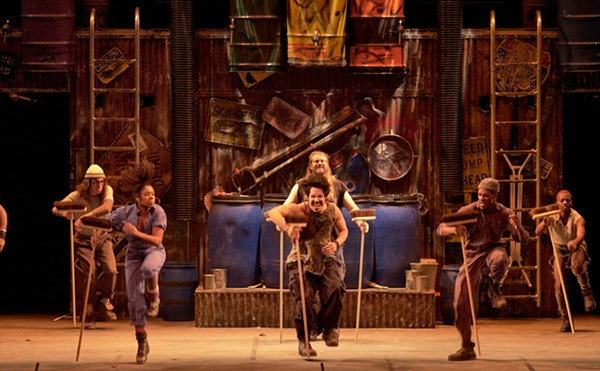Last weekend, the new century snapped to attention, with the monied gentry in black ties and satin evening gowns dining on caviar and lamb chops en croúte at the reopening of the newly beautified Severance Hall. Simultaneously, theatergoers in jeans and turtlenecks sought edification in a former warehouse transformed for a new life, with a raked stage and spic-and-span restrooms, at this year's attempt to emulate the ambiance of off-off-Broadway theater.
Charenton is appropriately named after the town that contained the asylum where the Marat/Sade inmates put on their mad little passion plays. Founders James A. Mango and Melissa A. Tilk are attempting to create a haven for the postmodern classics drummed into their consciousness by the ex-hippie profs of their college years.
Their press release gives promise of a turbulent theater where rhinoceroses, bald sopranos, and demons spawned out of Edward Albee, Harold Pinter, and Bertolt Brecht turn St. Clair Avenue into an absurdist big top.
Waiting for Godot is the ideal debut for a theater that eulogizes works that slap the status quo. Beckett started a revolution that continues to this day in the works of Pinter and Albee. Engaging in a bloody duel with the ephemeral, his plays obliterated the lace-curtain trivialities of plot ("Oh, my God! Sheila shot the bishop!") and made banal cries of social justice ("Strike! Integrate the neighborhood!"). He exposed Noel Coward and ilk as clacking harlequins exchanging witticisms "astride the grave."
Director/critic Harold Clurman summed up Beckett as "someone who wants to essentialize -- lay bare to the nth degree the ground patterns of life's course." Godot remains his most accessible play. His subsequent works receded into a minimalism that would show us nothing but a woman's lips or a few moments of gasping: despair on the head of a pin.
In Godot, two tramps wait in a mournful landscape for some god or perhaps con man who can show them the way. While they wait, they struggle with tight shoes, prostate problems, and whether to hang themselves ("hanging causes an erection"). Here the cynical nihilist and the dourly witty Irishman weigh in as equal partners. James Joyce's earthy humanity -- Leopold Bloom's endearing everyman bawdiness -- permeates the play, along with a flair for vaudeville wordplay and the keen comic pathos of Chaplin, the surrealism of Buster Keaton, and the slapstick give-and-take of Laurel and Hardy. The first English language production featured the inimitable Cowardly Lion, Bert Lahr (who claimed not to have understood a word of it).
Appreciating Godot is like coming to terms with the uncompromising bitter kick of a fine old brandy. You have to lose your taste for sweet fruity subterfuge and learn to luxuriate in the terse poetry of decay. Taking solace in Beckett's tramps' ability to go on bereft of an answer and, despite every failure to find one, to keep waiting and enduring, and then: "Shall we go?" "Yes, let's go." (Stage direction: They do not move.)
The feeble-minded may view this play as an exposé on the plight of the homeless, while the jaded may find it an excuse for Valium. When it premiered at a dinner theater in Florida, disgruntled seniors had to be stopped from hurtling their peach melbas at the cast.
In subsequent years, Godot has become the thinking man's talisman for human endurance in the worst of circumstances.
Director Mango, in his first Charenton endeavor, has attempted to lasso the moon, yet only managed to snag an asteroid. His is a young man's failure: He is too much of an optimist to reach Beckett's midnight of the soul, stopping somewhere around 10:30.
It's to his credit that much of the play's tenderness and warmth survive intact, and at intermission, only one couple walked out: an amazing feat for Godot. Yet it would be dishonest not to report that, where it desperately needs to be cruel, it is merely petulant. Sloppy direction and uneven pacing make the last half-hour seem interminable. The final collapse of the hapless sufferers emerges as a wet firecracker rather than the intended black comic Fall of Mankind.
Jim Volkert as the eternally cruel Master Pozzo and John Herbert as the eternally downtrodden Lucky are more successful in suggesting Ringling Brothers circus performers than the necessary archetypes of the damned.
Larry Nehring as Vladimir and Michael Regnier as Estragon are born to the roles, but need at least another decade to ripen into the painful aspects of their tramp characters. At present they shine in the broad comic aspects. They bring to mind, respectively, Dick Van Dyke's Rob Petrie and Carl Reiner's Alan Brady doing hobo routines while waiting for Mary Tyler Moore to show up.












